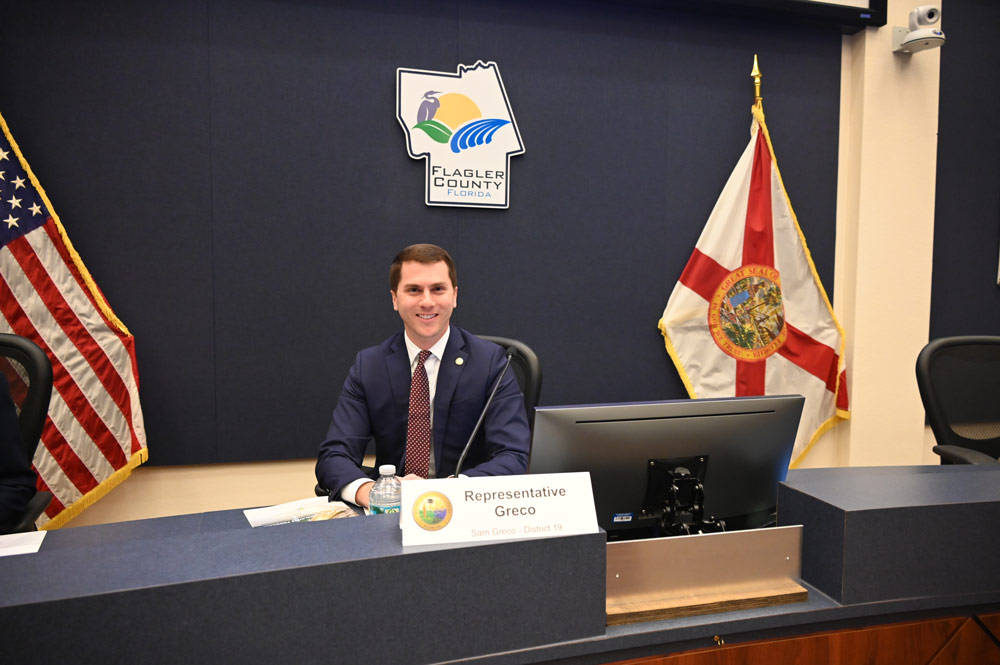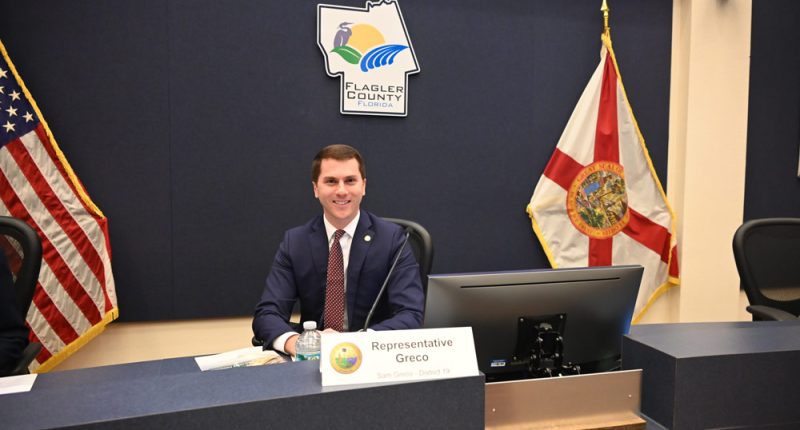
As lawmakers enter their final week of Legislative Session, at least one proposal still pending is causing a big stir, and would have potentially damaging consequences for Flagler County tourism promotion, beach protection and beach management.
A House proposal to use tourist development tax (TDT) dollars to offset property tax reductions would also eliminate all 62 of the state’s Tourist Development Councils (TDC), which work to attract visitors in all but five Florida counties. Collectively, the TDCs collect about $1.8 billion in revenue from TDTs, often referred to as the bed tax because it’s a tax collected from lodging stays.
The proposal passed the House on a 62-45 vote. Sam Greco, the Republican representing Flagler County and portions of St. Johns and Volusia, voted with the majority. The final version allows counties to use just 25 percent of bed tax revenue to promote their county’s tourism. Currently, Flagler County’s 5 percent tourism sales surtax generates about $4.3 million a year. Of that, 60 percent is devoted to promotion, 20 percent to beach preservation, and 20 percent to capital projects that improve the county’s tourism profile.
This week, Flagler County’s tourism council approved spending half the revenue for capital projects on beach protection for the next three years. The county is significantly dependent on tourism tax revenue to finance its beach-protection plan. All of that is now in jeopardy. The House bill requires local governments to offset property taxes with bed tax revenue starting next year. It leaves it in the hands of the County Commission to preserve its tourism promotion bureau by a vote of the commission–but not the tourism councils.
“The bill provides that, beginning July 1, 2025, all [tourism tax] revenues are available to counties to complete any project under way as of July 1, 2025, or for performance of any contract in existence on January 1, 2025, pursuant to the restrictions that exist currently,” according to a legislative analysis of the bill. “Revenues not needed for projects, contracts, or debt obligations may be used for any public purpose, rather than being limited to the current authorized uses” of tourism tax dollars.
The Senate’s version of the bill has cleared three committees.
The measure has received massive pushback from tourism leaders, from Pensacola to Jacksonville to South Florida and the Keys.
Don Welsh, President and CEO of the global tourism advocacy group Destinations International, penned an op-ed for the Tampa Bay Times this week describing the proposal as “an economic cliff” that could have sweeping implications, from dwindling tourism revenue to the eventual necessity of a state income tax.
“Florida doesn’t have a state income tax. Why? Because visitors pay their way,” he wrote, adding that it is no accident that Florida has a successful tourism industry that supports 2 million jobs. Instead, it’s the result of “decades of work by destination organizations, community leaders and local businesses.”
“The proposed legislation would undo that progress overnight,” Welsh continued. “We have seen similar impacts in other states when they have reduced funding.”
While Welsh is a leading voice in the fight against Florida’s TDC elimination proposal and plan to reallocate bed tax dollars for property tax credits, he’s far from alone.
The Amelia Island Convention and Visitors Bureau (CVB) was one of the earliest groups to speak out. Its Vice President, Paul Beirnes, told Florida Politics the plan would gut the tourism industry in Nassau County, where 36% of its jobs are related to visits from outsiders.
Beyond that, the CVB spends about $1 million each year on beach nourishment projects that not only further tourism in the region, but also support the livelihoods of locals.
Destinations Florida, the state’s association serving local tourism promotion organizations, is rallying opposition statewide, echoing other concerns about jobs and describing the tax package as “an act of economic sabotage.” But the group is also calling out the House’s fuzzy math, noting that while bed taxes bring in less than $2 billion in annual revenue, property taxes account for $16 billion.
“Big Government in Tallahassee wants to swipe the local and state tax savings every Florida household receives thanks to tourism-generated revenue and hand them back $1 in property tax credit. Meanwhile, it’s Florida residents who will have to foot the bill for beach renourishment, parks, public safety, and tourism-related infrastructure that Tourist Development Taxes already fund,” said Robert Skrob, the group’s Executive Director. “Tourist Development Taxes aren’t paid by residents. They’re a self-imposed, free-market solution by Florida’s lodging industry to grow our economy from the bottom up. The system works. Tourism is thriving. Residents benefit without bearing the cost.”
In Polk County, anchored by Lakeland, tourism leaders called the plan an “economic disaster waiting to happen.”

Visit Central Florida Director Mark Jackson said at a meeting in Auburndale this week that the proposal would net each household in Polk County just $58 in savings, on average, but would jeopardize the 41,000 jobs in tourism that support residents, according to the Lakeland Ledger.
In Putnam County, sandwiched in a mostly rural area between St. Augustine and Gainesville, tourism isn’t the first thing that comes to mind. But even there, the plan to reallocate bed tax revenue and ax TDCs could have serious implications, including by reducing attendance at events such as its Blue Crab Festival and Bassmaster Elite tournament. The events drew about 18,000 visitors in February, according to Action News Jax.
Kimberly Morgan, Vice President of the Putnam County Chamber of Commerce, said the county could not fund those events without TDTs. The county’s tourism revenue is reportedly nearly $88 million.
And like Welsh, Morgan also pointed to tourism revenue being the main driver for Florida’s continued ability to have no state income tax, a perk often used to attract new residents.
Pinellas County officials also are speaking out. Tampa Bay Beaches Chamber of Commerce CEO Charlie Justice, a former Pinellas County Commissioner, told Florida Politics that most chambers receive some direct support for things like welcome centers or event sponsorships, and that the local CVB is a “critical partner” in supporting more than 100,000 local families who rely on tourism to pay the bills.
Orlando officials, where tourism is perhaps best known throughout the state because of Disney World, are also sounding the alarm.
“We are closely monitoring legislative proposals related to the TDT and how they might impact already approved projects, including the KIA Center and Camping World Stadium. These are projects that went through an extensive public process and were ultimately approved by both the City Council and the County Commission,” said city of Orlando spokeswoman Ashley Papagni.
The threats are being taken so seriously that the Florida Association of Counties, which advocates for the interests of every county in Florida, has weighed in with caution.
“Our counties are not asking for indiscriminate flexibility as it relates to how we can spend TDTs. Nor are we wanting to shut down all the TDCs,” said the group’s Deputy Director, Jeff Scala.
“We’re not sure what, how the impact of the mechanism to account for the property tax offsets will work. I think there’s a lot of questions about how to allocate those credits and make sure that it is a fair process.”
And if that were not enough, tourism leaders outside of Florida are also raising issues in their own states.
In January, Senate Republicans in Montana proposed a similar plan to use tourism tax dollars for property tax relief. While supporters touted it as an effective way to provide needed relief to homeowners, tourism officials, as they did in Florida, lined up in opposition.
Some of them pointed to nearby Colorado, where the state’s tourism marketing budget was zeroed out in 1993. A paper by Longwoods International CEO Bill Siegel claimed the state “over time” lost $2 billion in annual revenue as a result. The decline was clear enough that some funding was restored in 2000. By 2006, tourism marketing was restored with a $19 million budget.
–FlaglerLive and Jannelle Irwin Taylor, Florida Politics







